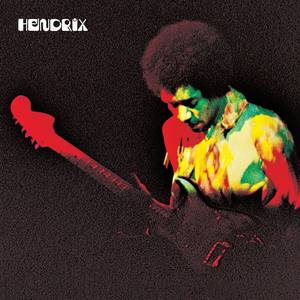Band of Gypsys was the only live recording authorized by Jimi Hendrix befor… Read Full Bio ↴Band of Gypsys was the only live recording authorized by Jimi Hendrix before his death. It was recorded and released in order to get Hendrix out from under a contractual obligation that had been hanging over his head for a couple years. Helping him out were longtime friends Billy Cox on bass and Buddy Miles on the drums because the Experience had broken up in June of 1969, following a show in Denver. This rhythm section was vastly different from the Experience. Buddy Miles was an earthy, funky drummer in direct contrast to the busy, jazzy leanings of Mitch Mitchell. Noel Redding was not really a bass player at all but a converted guitar player who was hired in large part because Hendrix liked his hair! These new surroundings pushed Hendrix to new creative heights. Along with this new rhythm section, Hendrix took these shows as an opportunity to showcase much of the new material he had been working on. The music was a seamless melding of rock, funk, and rhythm and blues, and tunes like Message to Love and Power to Love showed a new lyrical direction as well. Although he could be an erratic live performer, for these shows, Hendrix was on — perhaps his finest performances. His playing was focused and precise. In fact, for most of the set, Hendrix stood motionless, a far cry from the stage antics that helped establish his reputation as a performer. Equipment problems had plagued him in past live shows as well, but everything was perfect for the Fillmore shows. His absolute mastery of his guitar and effects is even more amazing considering that this was the first time he used the Fuzz Face, wah-wah pedal, Univibe, and Octavia pedals on-stage together. The guitar tones he gets on "Who Knows and Power to Love are powerful and intense, but nowhere is his absolute control more evident than on Machine Gun, where Hendrix conjures bombs, guns, and other sounds of war from his guitar, all within the context of a coherent musical statement. The solo on Machine Gun totally rewrote the book on what a man could do with an electric guitar and is arguably the most groundbreaking and devastating guitar solo ever. These live versions of Message to Love and Power to Love are far better than the jigsaw puzzle studio versions that were released posthumously. Two Buddy Miles compositions are also included, but the show belongs to Jimi all the way. Band of Gypsys is not only an important part of the Hendrix legacy, but one of the greatest live albums ever.
Credits
Jan Blom -- Photography
Billy Cox -- Bass
Heaven Research -- Producer
Wally Heider -- Engineer
Janie Hendrix -- Remastering Supervisor
Jimi Hendrix -- Guitar, Vocals, Mixing
Robert Herman -- Photography
Eddie Kramer -- Remixing, Mixing, Remastering, Engineering Supervisor
George Marino -- Remastering
John McDermott -- Liner Notes, Remastering Supervisor
Buddy Miles -- Drums, Vocals
Joseph Sia -- Photography
Chart & Awards
1970 -- Band Of Gypsys -- R&B Albums No. 14
1970 -- Band Of Gypsys -- The Billboard 200 No. 5
Credits
Jan Blom -- Photography
Billy Cox -- Bass
Heaven Research -- Producer
Wally Heider -- Engineer
Janie Hendrix -- Remastering Supervisor
Jimi Hendrix -- Guitar, Vocals, Mixing
Robert Herman -- Photography
Eddie Kramer -- Remixing, Mixing, Remastering, Engineering Supervisor
George Marino -- Remastering
John McDermott -- Liner Notes, Remastering Supervisor
Buddy Miles -- Drums, Vocals
Joseph Sia -- Photography
Chart & Awards
1970 -- Band Of Gypsys -- R&B Albums No. 14
1970 -- Band Of Gypsys -- The Billboard 200 No. 5
More Genres
No Artists Found
More Artists
Load All
No Albums Found
More Albums
Load All
No Tracks Found
Genre not found
Artist not found
Album not found
Search results not found
Song not found
Band Of Gypsys
Jimi Hendrix Lyrics
Changes Jimi: "Buddy Miles is goin' to do something he wrote called…
Machine Gun Machine gun Tearing my body all apart Machine gun Tearing m…
Message To Love (Yeah) well, I travel at the speed of a reborn…
Power To Love Shoot down some of those airplanes your flyin' Especially t…
We Gotta Live Together "We'd like to say, we'd like you to clap your…
Who Knows They don't know They don't know Like I know Like I know Do…

Devin Kennedy
on Spanish Castle Magic (alternate take)
Is this really the alternete take